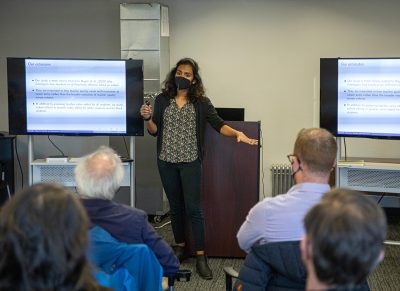A good teacher can make all the difference in a child’s development, and the relationship between teachers and students, particularly in primary school, is influential in student growth. Today’s children have an increasingly diverse spectrum of teachers, though the process to become one is more extensive and consuming.

The Boston University Wheelock College of Education and Human Development hosted an event Tuesday called “Ok Boomer: Generational Differences in Teacher Quality,” featuring Javaeria Qureshi, an associate professor of economics at the University of Illinois at Chicago. The seminar explored teacher quality concerning teachers in three generational cohorts — Baby Boomers, Generation X and Millennials.
Qureshi said that teacher shortages — especially over the pandemic and as the older generation retires — have led to concerns over the impacts on education quality.
“There’s also this widespread perception that as this particular cohort of teachers is retiring, we might be losing some of our best teachers,” Qureshi said during the seminar.
Qureshi said one way in which teaching quality can be measured is through students’ test scores. However, she added that this method of measuring has raised some concerns that some “might just be better at teaching to the test.”
“That’s certainly possible,” Qureshi said in an interview. “Other studies have shown… when you follow their students later, a couple of years down even into adulthood, you see that the students have better long-run outcomes like better educational attainment, higher earnings and so on.”
Diane Levin, a clinical professor at Wheelock, said this method of measurement is not always accurate as standardized tests are based on memorization versus the application of learned skills.
“Teachers started being evaluated based on how kids did on the test, but it was a test… that [had] rote answers, right or wrong answers, not thinking answers,” Levin said in an interview, adding that teaching to the test can change a teacher’s interaction with children and how they teach.
Qureshi said that changes in teacher quality among the different generational ages may be less about whether younger teachers can adapt more quickly to the new curriculum, but rather how they mirror the representation of student races.
“The reason we still see overall that the more recent generations of teachers are millennial teachers and Gen X teachers are more effective at teaching Black students than the boomer teachers is because most of the teachers are white,” Qureshi said, “and among the Boomer generation, more than 80% of the teachers are white.”
According to a 2020 analysis published by the Wheelock Educational Policy Center, Massachusetts continues to see an increase in racial diversity amongst newly hired teachers.
Qureshi’s research also highlights that Black students tend to perform better with younger teachers.
“The results are much stronger when it comes to teaching Black students versus white students,” Qureshi said in an interview. “That, to me, suggests perhaps it’s not just the changes in the curriculum, and the more recent teachers are… more adept at [teaching students of color].”
Natalie Godovnikova, a freshman in Wheelock, said that she feels teaching styles can vary depending on whether teachers can relate to her age group better.
“I feel like I experienced some generational differences with my teachers in the way that they spoke and the way that they interacted with us,” said Godovnikova. “It was easier to interact with them because they were closer to our age group… they still had a pretty fresh sense of what it was like to be [our age], so it just felt like they got it more than the older generations.”
Katey Cooney, a freshman in the College of Communication, said that she has experienced different teaching styles among teachers and professors of different ages.
“Older teachers have more of a philosophy of like, ‘We’re here genuinely to learn stuff,’ which is true, but I think younger teachers understand also that we do need to do really well on the test to do well in school,” Cooney said. “Older teachers are more prone to tangents in my experience.”
Qureshi said there will always be concerns over changing curricula and teaching quality as different generations of teachers will be differentially effective, but “we haven’t been able to identify or isolate how much that’s playing a role.”
“Going forward, a few years later, there’s going to be new changes, and then the next generation is going to be better at adapting to those new teaching techniques, or curriculum,” Qureshi said. “This is just a normal cycle that continues.”



























































































































